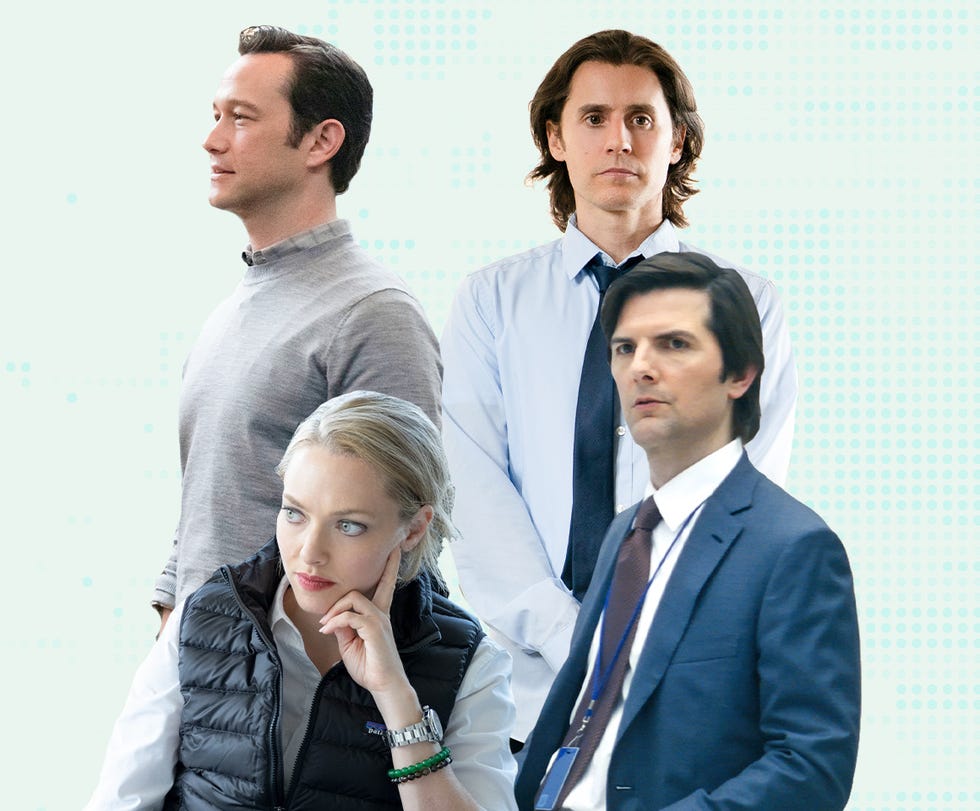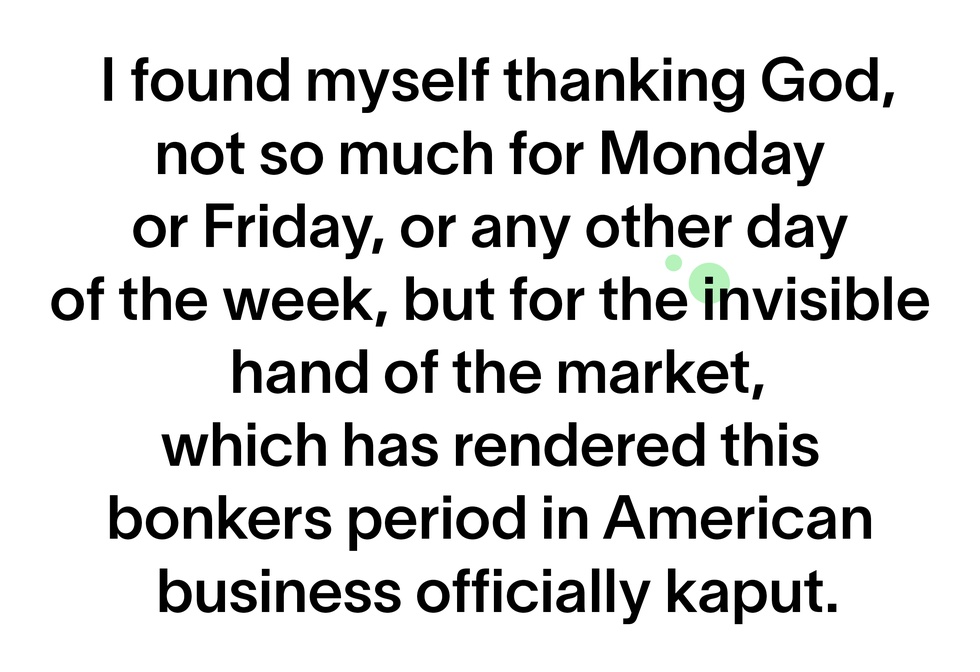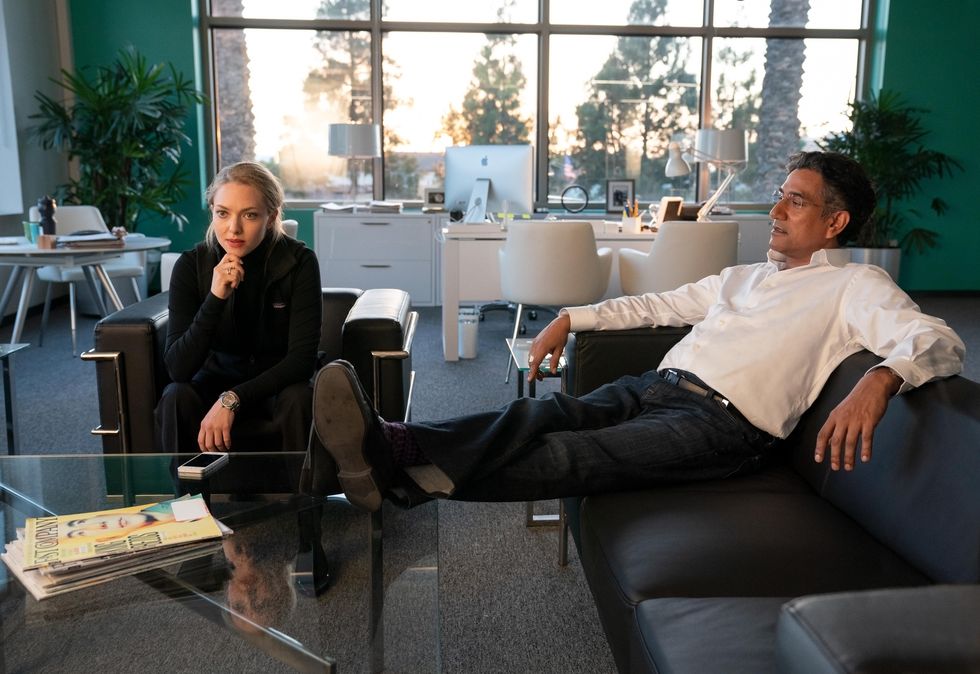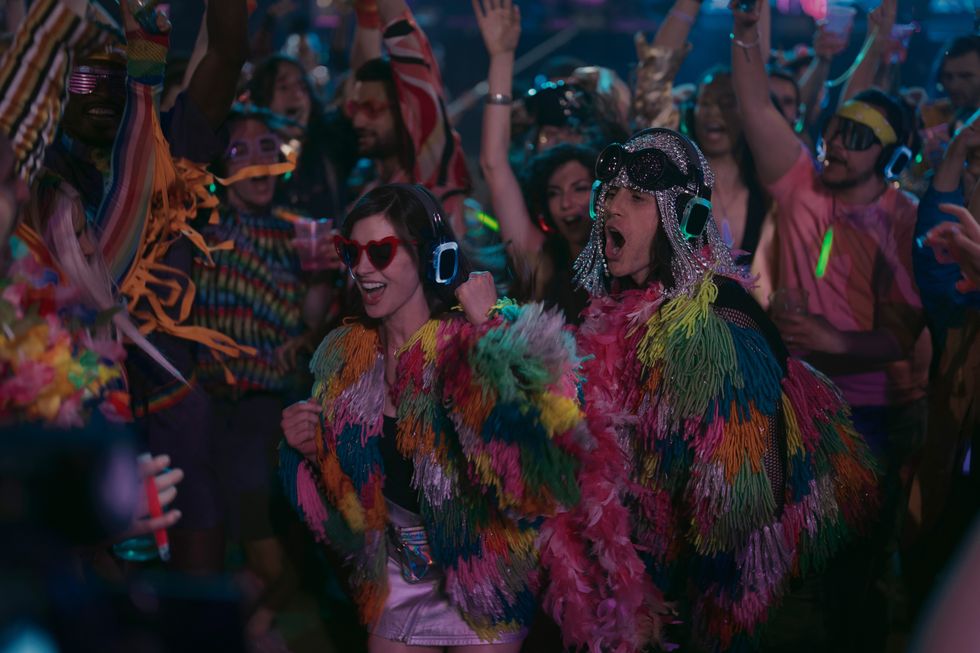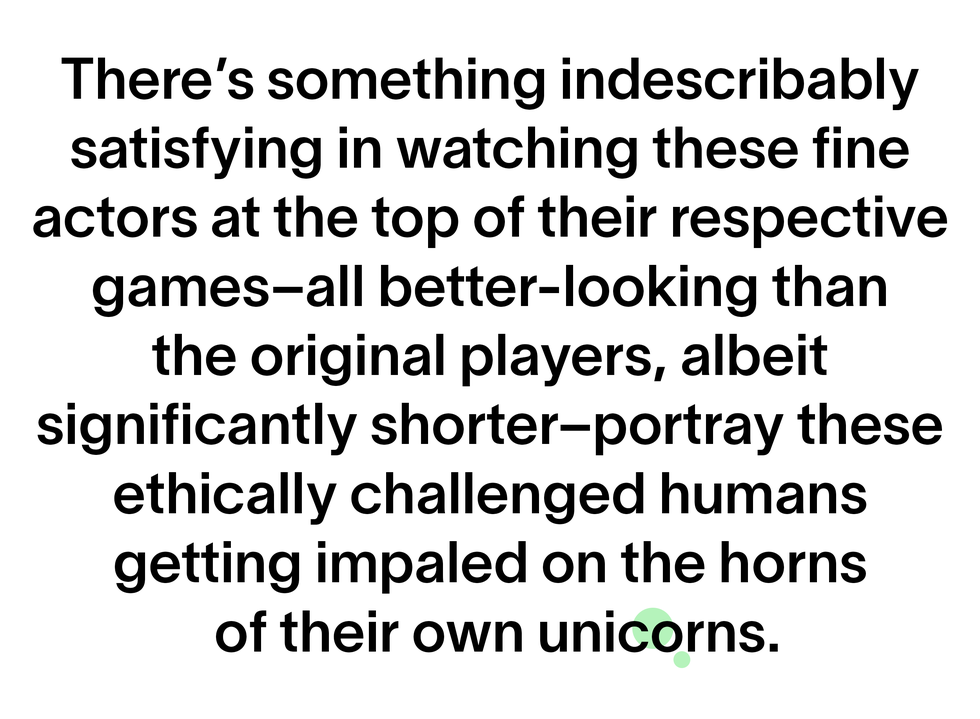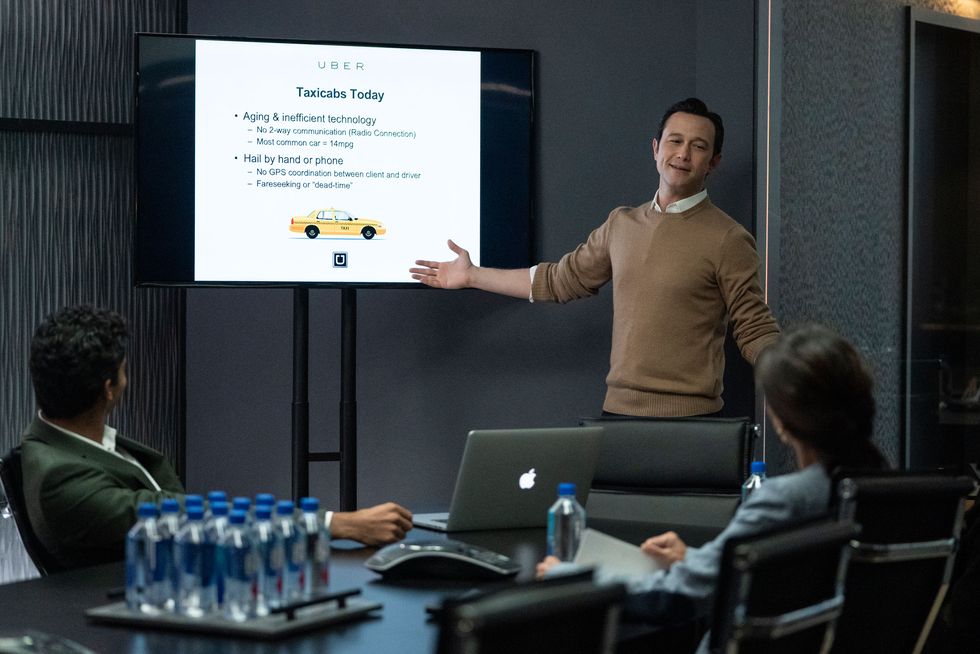In the third episode of WeCrashed, the addictive Apple TV+ series that chronicles the rise and fall of co-working giant WeWork, there is a scene so preposterous, so insanely over the top, that you know it has to be true. In it, a hoodie-clad Jared Leto, in (prosthetically enhanced) character as WeWork’s Israeli co-founder and CEO Adam Neumann, stands at the top of a staircase in a gorgeous open-plan office, his eyes reflecting a neon “Hustle Harder” sign on the opposite wall. “Let the rest of the world give thanks on Friday!” he shouts to the crowd of young, shotglass-wielding employees arrayed before him. Which day of the week do they like best? “Thank God it’s Monday!” the minions bellow, pumping their fists in the air before participating in a call-and-response chant in which Neumann yells “We!” and the group yells back “Work!” In fact, this was an accurate dramatisation of WeWork’s “Thank God It’s Monday” team-building sessions, requiring employees to stick around well after normal business hours to booze it up with the boss.
Nobody in the history of the universe has ever been this excited about working. But if you were employed by a tech company within the past decade, as I once was, you’d relate to the feel-good communal spirit, the rah-rah ethos that caused us all to “lean in” so hard that the boundaries between work and life blurred to the point of invisibility. (This, incidentally, is the subject of a new dystopian series from Apple TV+ called Severance, which imagines a world in which people can have an elective memory-erasure procedure to cordon their business lives off completely from their personal lives.)
As strange as it may seem, there was once a time when we didn’t feel compelled to memorise corporate mantras, when things like gratitude, culture, identity, and community were anathema to the core of the capitalist exchange. As Don Draper told Peggy Olson on Mad Men, set at a Madison Avenue ad agency in the 1960s, “That’s what the money is for!” All this is to say that, while watching the screeners for WeCrashed, which debuts on March 18, I found myself thanking God, not so much for Monday or Friday, or any other day of the week, but for the invisible hand of the market, which has rendered this bonkers period in American business officially kaput.
A decade after entrepreneur-turned-VC Marc Andreessen declared in the op-ed pages of the Wall Street Journal that software was “eating the world,” Silicon Valley is eating pop culture. In addition to WeCrashed on Apple TV+, on March 3, Hulu premiered The Dropout, which tells the story of Elizabeth Holmes (Amanda Seyfried), the disgraced, deep-voiced founder of blood-testing startup Theranos. Showtime’s Super Pumped, in which the adorably bedimpled actor Joseph Gordon-Levitt plays Uber’s toxic bro founder Travis Kalanick, dropped on Feb. 27. While the specifics of all these tales may be different, the psychological profiles of the subjects at their center, specifically their voracious appetites for risk and their wanton disregard for others, will remain signatures of the fake-it-till-you-make-it era.
Although these series are literally ripped from the headlines, the stories seem increasingly removed from our current reality, as record numbers of workers are resigning from their jobs en masse amid The Great Resignation, not to mention a pandemic and the outbreak of war in Europe. A new labor movement is picking up steam, with employees at companies ranging from Starbucks to Google organising for better working conditions. Many of us are now working from home, if we’re working at all. Some of us (not naming names here) are hanging around, trying to avoid doomscrolling. Thankfully, there is a generous bounty of scathing indictments of “Hustle Harder” culture, available to enjoy on demand from the comforts of our couches–on a weekday, if we so desire. Instead of shouting “We! Work!” we’re whispering “We don’t want to work.” Instead of hustling harder, we’re not hustling at all.
Entrepreneurship, over the past decade, was seen as the best, most virtuous way to get ahead, break free of market forces and establish generational wealth in a time of rising inequality, a path to influence our culture, disrupt legacy industries and even, yes, save the world. The “tech bro” and the “girl boss” became new aspirational archetypes for Millennials and older members of Gen Z, moving fast and breaking things while trading power suits for Allbirds sneakers, hoodies, and Patagonia vests. The vestments might have been casual but the visions were exalted: WeWork wasn’t renting desks; it was “elevating the world’s consciousness.” Uber wasn’t a cab operator; it was “a ride-sharing service” that gave people “flexibility” and “freedom.” Theranos was not a blood-testing company; it was going to give consumers control over their own health information so “no one has to say goodbye too soon.”
This was, of course, bullshit. Theranos, for all its grandiose claims, never was able to build a functional prototype. Once valued at $9 billion, the company dissolved in 2018 with just $5 million left to distribute to its creditors; Holmes was convicted of defrauding investors earlier this year. WeWork saw its $47 billion valuation plummet following a failed IPO in 2019, after which Neumann and his wife, Rebekah–played in WeCrashed by Anne Hathaway with a chef’s-kiss blend of ennui and entitlement–were pushed out of the company. After significantly shrinking its real-estate footprint, the company has since gone public via a SPAC merger, valuing it at $9 billion. Of the three startups being dramatised on TV, Uber has emerged as the most successful, the only one that has been elevated to verb status in the common lexicon, woven into the fabric of our day-to-day lives. Yet, its stock is trading below its 2019 offering price and Kalanick resigned in 2017 following months of nonstop sexual harassment scandals, among other disasters.
If these new captains of industry were supposed to inspire a generation, they have failed miserably. Yet, the chasm between the promise and the reality of their visions does make for some seriously compelling TV. The pilot episode of Super Pumped begins with a job interview. “Are you an asshole?” Gordon-Levitt as Travis Kalanick, asks a starry-eyed applicant, who isn’t quite sure how to respond. We then witness what happens when an entire organization has answered in the affirmative: a venture-capital-fueled price war to squash the competition, the legacy cab business in San Francisco, which becomes the first city to fall in Uber’s quest for global domination. In The Dropout, we see a young Elizabeth Holmes aboard billionaire Larry Ellison’s yacht, drinking in his advice to just “GTFM”–aka Get the Fucking Money. Even though Theranos’s blood testing device is malfunctioning right before a critical demo, Holmes fakes it in an effort to GTFM, and is rewarded for doing so with an investment from Ellison. And in WeCrashed, we watch Neumann fly to a conference in India to position then-struggling WeWork as a software company–calling it “Space as a Service,” a play on the popular “Saas” acronym, software as a service–for no reason other than to make it appealing to Softbank’s tech-focused investor Masayoshi Son. Then, just as the company was headed for insolvency, Softbank writes him a check for $4.4 billion.
Most of us already know how these stories end. The scripted dramas are, after all, the product of a multi-year television development cycle that started with optioning existing books (Super Pumped) and podcasts (The Dropout and WeCrashed). I’m guessing that many viewers, if they’re anything like me, have already devoured all the news articles, podcasts and books on which these shows are based. But, as Aristotle said in The Poetics, the purpose of drama is catharsis, and there’s something indescribably satisfying in watching these fine actors at the top of their respective games–all better-looking than the original players, albeit significantly shorter–portray these ethically challenged humans getting impaled on the horns of their own unicorns.
In many ways, the Silicon Valley entrepreneur is supplanting the serial killer as our TV villain du jour, and it’s a development I applaud. In this world of White-Collar True Crime, the stakes are still high–billions are on the line–but nobody winds up murdered. We can cringe, but we need not avert our eyes. The “victims,” for the most part, are already rich, and most of them will stay that way. We can root for the downfall of the protagonist while also mocking the supposedly sophisticated investors who bought into their lies. And, most of all, as we watch the founders get their just desserts, we can experience the thrill of accountability in a time when it feels like there is none.
Not everyone is thrilled about this trend. “Hollywood refuses to write even one story about an actual company startup where the CEO isn’t a dweeb and/or evil,” tweeted Elon Musk, the world’s richest man and the founder of Tesla and SpaceX. Of course, Musk–who is currently being investigated by the SEC for insider trading and was sued by the state of California for racist practices–will eventually have his Hollywood moment too, with a six-part scripted series from HBO adapted from the biography “Elon Musk: Tesla, SpaceX, and the Quest for a Fantastic Future,” which the network says is currently in development.
Rachel Dodes is a New York-based culture writer and contributor to Esquire. Her first novel, The Memo, will be published in June 2024 by Harper Perennial.
